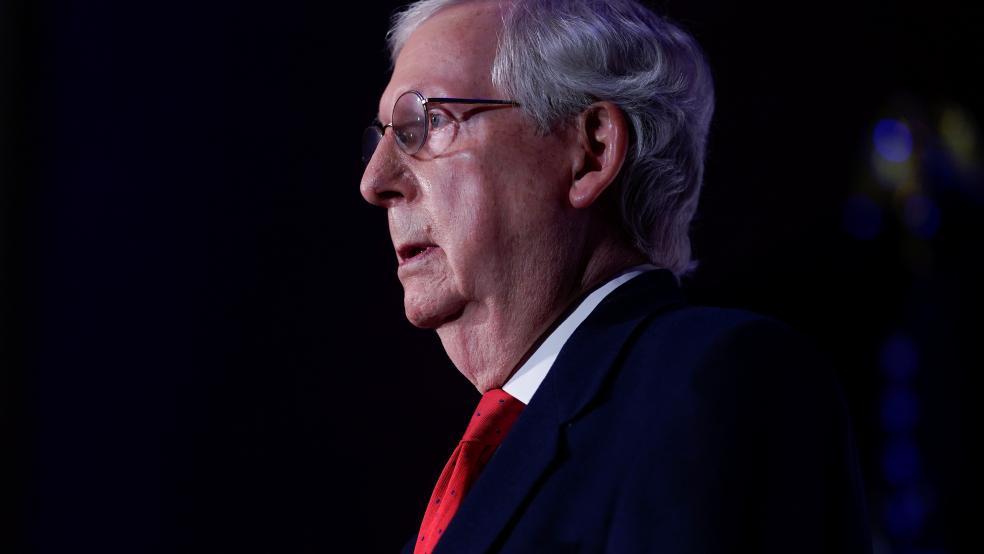As President Joe Biden works to sell his $4.1 trillion plans for infrastructure and safety-net programs — and the tax hikes on corporations and the wealthy that he proposes to help pay for them — Republicans are looking to set the terms for upcoming negotiations.
Senate Minority Leader Mitch McConnell (R-KY) said Monday that Biden isn’t likely to get any Republican support for his current spending proposals.
“I think it's worth talking about but I don't think there will be any Republican support — none, zero — for the $4.1 trillion grab bag that has infrastructure in it but a whole lot of other stuff,” McConnell said at a press conference at the University of Louisville.
Senate Republicans have proposed a $568 billion infrastructure package that Democrats have criticized as providing too little new money. McConnell reportedly said that the GOP proposal isn’t a hard cap, but emphasized that his party wants to limit the scope of the package.
"We're open to doing a roughly $600 billion package which deals with what all of us agree is infrastructure," McConnell said. "If it's going to be about infrastructure, let's make it about infrastructure."
What’s next: White House Chief of Staff Ron Klain said Sunday that Biden would invite several Republicans to the White House this week for talks.
“The White House wants to see counteroffers to Biden's $2.25 trillion infrastructure plan by the middle of this month, and if progress isn't being made by Memorial Day, officials will reassess their strategy of trying to build bipartisan support,” Sahil Kapur and Shannon Pettypiece of NBC News report, citing a person familiar with the negotiations.
The two sides are approaching the negotiations warily, with each worried that the other side isn’t bargaining in good faith.
"Let's decide what are they prepared to consider in terms of what constitutes infrastructure, how much of it, and then we can talk about how to pay for it if we get to the point that we actually have a real number," Biden told reporters last week after a phone call with Sen. Shelley Moore Capito (R-WV), who is heading the GOP’s infrastructure efforts. "If it's like last time — and I don't, I think she's serious — but if, like last time, they come in with one-fourth or one-fifth of what I'm asking and say, 'That's a final offer,' then it's a no-go for me."
The fight over corporate taxes: How to pay for infrastructure spending has always been a sticking point, and the two sides still face fundamental disagreements over the idea of tax increases.
Rep. Kevin Brady (R-TX), the top Republican on the House Ways and Means Committee and a leading architect of the 2017 tax cuts that Biden wants to largely reverse, predicted in an interview with CNBC Monday that “there’s going to be a real fight over these tax increases.”
Brady said that there was room for compromise on infrastructure but suggested that lawmakers should fund any package by first seeking to eliminate waste and fraud from federal tax credit programs and rededicating tax provisions that he said used to fund infrastructure but have suffered what he called “mission creep.” Brady also said the private sector should play a larger role. "U.S. lags the rest of the world in attracting private capital into infrastructure for some reason. That is an area that Congress needs to get serious about because private capital rather than tax dollars can help us fund basic infrastructure," he said.
On the Democratic side, Senate Finance Committee Chair Ron Wyden (D-OR) said he wanted to find common ground but that the Republican position that multinational corporations “should not pay a penny for infrastructure" made it harder to do so. "Pretty hard to make anything bipartisan out of that," he said.
Biden on Monday defended his call for higher corporate taxes. “I come from the corporate capital of the world,” he said. “More corporations are incorporated in the state of Delaware than all the rest of the nation combined. And I’m not anti-corporate, but it’s about time they start paying their fair share.”
The president also sought to make the case for his plans to raise taxes on the rich. “Do we want to give the wealthiest people in America another tax cut? Or do you want to give every high school graduate the ability to earn a community college degree?” Biden asked. “Is it more important to keep these tax loopholes for millionaires — for good people, not bad folks — or would we rather put $7,200 in the pockets of working moms and dads every year if they have two children?”
The bottom line: Infrastructure has long been described as one policy area where there’s room for bipartisan cooperation. We may find out this month whether there’s any truth to that.





